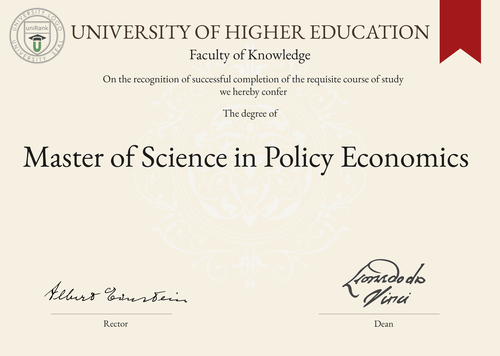
Master of Science in Policy Economics (MSc in Policy Economics)
Guide to Master of Science in Policy Economics Program/Course/Degree
Master of Science in Policy Economics (MSc in Policy Economics)

Program Name:
Master of Science in Policy EconomicsProgram or Degree abbreviation:
MSc in Policy EconomicsDuration range:
Varies by country and university, typically 1-2 yearsTuition range:
Varies by country and university, typically $10,000-$30,000 per yearOverview:
The Master of Science in Policy Economics program is designed to provide students with a deep understanding of economic theory and its application to policy analysis. This interdisciplinary program combines economics, political science and public policy to equip graduates with the skills necessary to analyze and develop effective policies in various sectors.Curriculum Overview by year:
The curriculum is structured to provide a strong foundation in economic theory and quantitative methods in the first year. In the second year, students can choose from a range of elective courses to specialize in areas such as environmental policy, healthcare policy, or international development.Key Components:
The key components of the program include courses in microeconomics, macroeconomics, econometrics, policy analysis and research methods. Students also have the opportunity to engage in hands-on policy projects and internships to gain practical experience.Career Prospects:
Graduates of the Master of Science in Policy Economics program can pursue careers in government agencies, international organizations, think tanks, consulting firms and non-profit organizations. They can work as policy analysts, economic consultants, research associates, or program managers, among other roles.Salary Expectations:
Salary expectations for graduates of this program can vary depending on factors such as location, industry and level of experience. On average, policy economists can earn a starting salary of $50,000 to $70,000 per year, with the potential for higher earnings as they gain more experience.Conclusions:
It is important to note that the duration, tuition fees, curriculum, key components, career prospects and salary expectations of the Master of Science in Policy Economics program can vary depending on the country or location where you choose to study, as well as the university you select. Visitors interested in pursuing this degree are encouraged to use the uniRank World Universities Search Engine to explore options and find universities offering this specific degree program worldwide.World Universities Search Engine
search for Master of Science in Policy Economics (MSc in Policy Economics) and add the Location (country, state etc.) or specific University you are interested in studying at.
Query examples:
- Master of Science in Policy Economics (MSc in Policy Economics) United States
- Master of Science in Policy Economics (MSc in Policy Economics) United Kingdom online
- Master of Science in Policy Economics (MSc in Policy Economics) Australia international students
- Master of Science in Policy Economics (MSc in Policy Economics) University of California
- Master of Science in Policy Economics (MSc in Policy Economics) University of London tuition fees
- Master of Science in Policy Economics (MSc in Policy Economics) University of Sydney scholarships
Share Program/Course
Interesting? Share this program/course/degree info with your friends now.